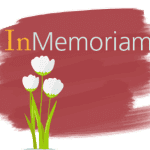30 years of creating zest, pop and punch
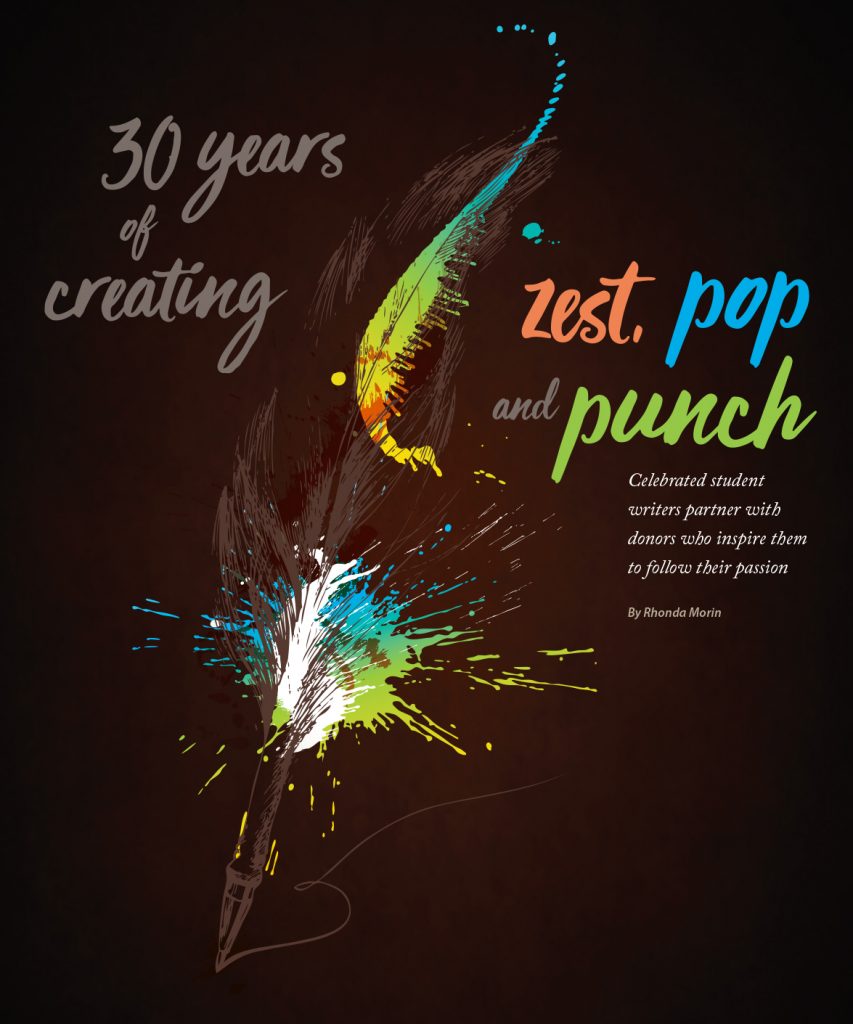
The Columbia Writers Series is celebrating its 30th year at Clark College. Since its humble beginnings, the literary arts celebration has welcomed local, national and international authors to campus thanks to the efforts of dedicated English faculty.
Ursula Le Guin, a popular writer of science fiction and fantasy who died earlier this year, appeared at the series, as did Jess Walter, National Book Award finalist and Edgar Allan Poe Award recipient. In 2015, Walter came to Clark’s campus in to read from a piece he was writing at the time and talk about his creative process.
Subtext is born
Extra zest was added to the series in 2014, when Clark English professor Alexis Nelson joined professor Jim Finley as co-director of the Columbia Writers Series. She brought ideas about promoting all that Clark had to offer in writing, literature and publishing. Nelson’s idea was to unify certain events, awards and publication launches within the English department.
“I wanted to bring all these things together to celebrate literary works as a whole group and to highlight them all together,” said Nelson.
She created Subtext.
Subtext is a week-long literary festival in May of writers, readings, events, workshops and student writing award announcements. In the past, there’s even been a poetry workshop to connect prison inmates with people on the outside called Free Minds Prison Poetry.
“There was a groundswell of interest in creative writing a few years ago when the Columbia Writers Series became a program,” said Nelson. “That’s why we‘ve been creating an enhanced community around literature, composition, creative writing and poetry.”
Nelson is referring to a change that occurred in 2014, when Clark’s student government, the Associated Students of Clark College (ASCC), approved a faculty request for the English department to manage the series’ budget and put the series in a position to receive more financial support. Prior to that approval, Clark’s Student Life department managed a $2,500 budget. In contrast, funding during each of the last three academic years was more than $15,000, according to Sarah Gruhler, director of student life.
During the packed May week, the latest Phoenix, Clark’s student art and literary journal, is unveiled; department awards are bestowed and workshops are held; and top Clark students are awarded prestigious accolades in the form of Student Writing Awards. The writing covers academic and technical prowess to creative writing and poetry.
Each April, a handful of Clark students receive word that they’ve been selected as recipients for these four prestigious writing awards. Through the generosity of three estates, Clark College Foundation distributes awards ranging from $50 to $500. English faculty select the best works from their students ranging from the imaginative—“Novocain” by Andrea Beauchamp—to Travis Johnson’s practical “Feasibility of Investment into Graphene.”
Students are celebrated at a May banquet during the Subtext festival.
Creative writing awards
What does it take to be a writer? Does it start with scribbles in the margins of books that you feel you could say better? Or is it slips of paper tucked into pockets or in between math assignments? In today’s public oversharing, millions of decrees are transmitted through Ethernet cables every second screaming for attention.
How do we rise above the noise? Does anyone notice our struggle to put to paper what this voice—ricocheting off our grey matter—demands of us? We don’t have a choice; we must write. But who cares? Would anyone actually want to read this stuff?
Clark College is a safe harbor for up-and-coming writers. By offering basic English courses, a literary journal, an annual Subtext festival, scholarships and writing awards, the college provides a starting point for individuals to knead their ideas into sentences, paragraphs, essays and full stories for public display.
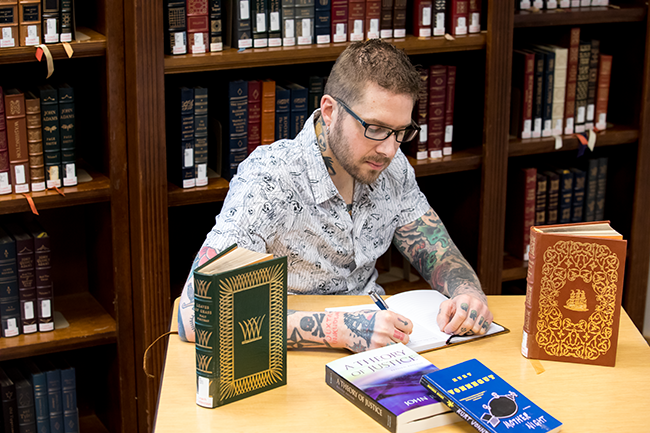
William Erickson ’16, Clark writing award winner, scholarship recipient
Glazier turned writer
William Erickson ’16 is a glazier and occasional creative writer who, while getting coffee at a local gas station one morning, had an epiphany that he wanted more out of his life than taking over the family glass business. Erickson, 36, enrolled at Clark with the goal of pursuing a practical course of study that would lead to his desire to help others: at the time he thought that was nursing.
After just one quarter, he mastered his studies and amassed a 4.0 GPA, while working nearly full time. Following several comparable quarters, he was ready to enroll in advanced courses like human anatomy and physiology, when a talk with his chemistry professor changed his path.
‘You can write grants or technical manuals in the medical field,’ he recalls the professor telling him.
To test the theory, Erikson enrolled in Alexis Nelson’s creative nonfiction technical writing course the next quarter. Soon after he abandoned the nursing program.
“Her course was good for my confidence,” said Erikson.
Since then Erikson’s writing has been prolific; he’s published in 2017 Phoenix, Clark’s art and literary journal; in Washington State University’s journal LandEscapes; has amassed bundles of essays, poetry, memoirs and fiction; and got a small piece published in Sun Magazine, a national journal.
He’s been noticed. While at Clark he received the Thelma Nylund Scholarship for two quarters during the 2015-2016 academic year. The $1,700 tuition scholarship is a highly competitive award, according to Shirley Schwartz, Clark College Foundation’s director of scholarships.
And in 2016, he received the Gallivan Award for Creative Writing for his memoir piece “Smoke Break.” Clark College Foundation distributed a check directly to Erikson, as it does with other types of writing awards. Though the gift was small—$60—its value was priceless to Erickson.
|
Smoke Break: A Memoir By William Erickson My hooliganry rested comfortably between Zach and Tommy. I wasn’t the toughest kid, by any stretch, but I wasn’t bloobery either. I was known for my creative and well-placed use of expletives. Classmates shuddered to think of tangling with my peppery tongue, though they always lauded my performance on the schoolyard. Even so, salty language only carries you so far in the real world. Watching the smoke waft lightly about Zach and Tommy, emanating dapperly from between their fingers and coming to rest in layers that hung like translucent shelves, I couldn’t wait any longer. They looked so cool, easily twice my age. It was high time I join the ranks of them—of the Dylans, the Fonzis, the James Bonds and John McClanes. Putting the cigarette back to my lips, I struck the Bic and drank in the fiery miasma, completely forgetting Tommy’s blunder. My throat tried to close, but I wouldn’t let it. The burn was furious and I quickly exhumed the seething murk from my body, straining not to vomit. When I breathed the clean air afterward, its cold was shocking—like a bottle brush scouring my windpipe. Within seconds my head started to spin. The playground wobbled on its axis and my trachea throbbed. As my eyes spun inside my skull I caught glimpses of my cohorts snickering. Read more of William’s work. |
“It’s not about the money. The award was a huge boost for my confidence as a writer,” he said. Subsequently, Erikson started writing and publishing more short memoirs.
“I never considered my writing a noteworthy talent until I got that award,” he said, adding that any reservations he held on to about pursuing a nursing degree went away once he had the accolade. From his award-winning podium he stepped up to the next level when he transferred to Washington State University Vancouver to pursue a bachelor’s degree in creative media and digital technology and also landed a part-time job at their writing center.
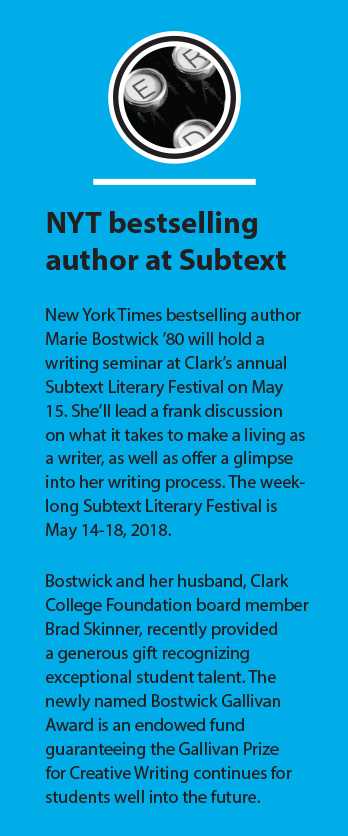 Georgia Mae Gallivan
Georgia Mae Gallivan
Georgia Mae Gallivan—the woman who bequeathed the fund—taught English at Clark from 1957 to her retirement on June 16, 1978. During her tenure, she served as head of the English department, chair of the Humanities division and president of the faculty association.
Upon retirement, she served on Clark College’s Board of Trustees for 10 years beginning in 1985, and the Washington Commission for the Humanities (today known as Humanities Washington). She volunteered for Friends of the Columbia Gorge, American Civil Liberties Union and Women in Action. She was also a 1996 Woman of Achievement recipient (today known as Iris Awards). She died in 2010. The Gallivan Prize for Technical Writing and the Bostwick Gallivan Award for Creative Writing (newly names, see sidebar) are awarded biannually as part of Clark’s Student Writing Awards.
Hawkins Prize for Academic Writing
The academic essay will never be a New York Times’ bestseller, but analytical essays do play a major role in the college experience. That’s where the Hawkins prize comes in: it honors the best work students do in the classroom in four essay areas, academic, expository, research and critical.
Academic essays, for example, are selected from students in preparatory English courses, known as pre-college. The expository essay highlights the 101-level English course, while the research essay prize is designated for students in the English 102 course. The critical essay award is available for any literature course.
“This award honors students of all levels and is especially beneficial for those who don’t see themselves as writers,” said Nelson.
Former professor Richard Hawkins, who regularly promoted the literary arts throughout Southwest Washington, would approve. Hawkins was known for his love of the humanities. He taught English composition, literature, Shakespeare, British literature, poetry and fiction. He began his career at Clark in 1959 as an English professor, served for years as the head of the department and was also a long-time chair of the Humanities division. In the community, Hawkins’ quiet, but driving, force touched local artists, scholars and citizens by bringing them into local venues, as well as hosting poetry workshops and contests for professionals and students. When he died from cancer in August 1988 at age 56, Clark’s Columbia Writers Series was just getting started.
Former Clark vice president Ellis Dunn had this to say about Hawkins following his death: “Dick Hawkins was a peer model for me. I have sought to emulate his warm rationality, his unswerving commitment to humane values, his gentle approach to people, and most of all, his ability to use humor as a way to keep things in perspective,” according to an August 18, 1988, article in “Run of the Mill,” a faculty and staff newsletter.
Hawkins’ estate established an endowment, which today represents up to 18 awards a year for deserving students. Hawkins Hall, located on Clark’s main campus, is named in his honor.
Last year’s winners of the Hawkins prize include Belynda Barton’s “Behind the Scenes of Professional Players’ Family Lives” ; “Administrative Influence and Preventing the Academic Crash” by Colin Smith; and Khessed Yoder’s “The Importance of Bilingual Programs in Early Education.”
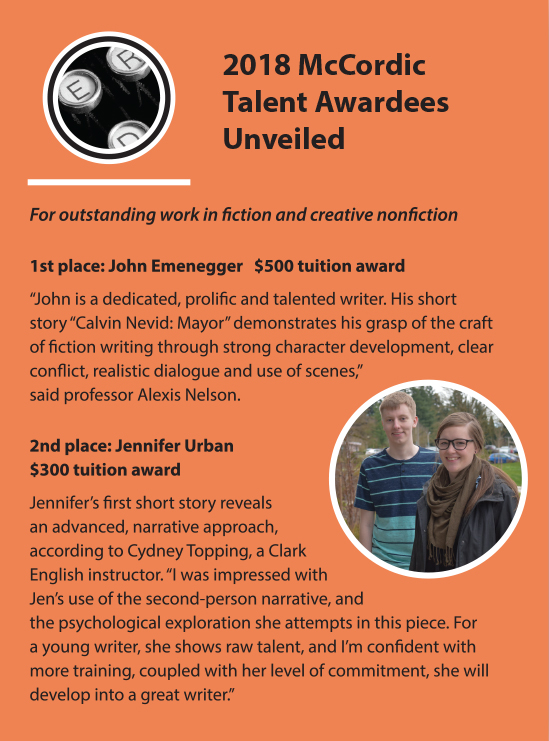 McCordic Talent Award for Creative Writing
McCordic Talent Award for Creative Writing
Edda McCordic dedicated her life to education during her more than 50 years as a teacher and librarian in the Vancouver public schools, and as librarian at Clark College in the 1940s. She received her bachelor’s and master’s degrees from the University of Oregon.
Edda McCordic died in 1983 at the age of 94. A trust she created was prepared to offer scholarships to Clark College students. A group of faculty convened and decided a talent award would best represent her desire to reward students who have creative ambition and are achieving scholastic success. Consequently, for decades Clark students have received awards in writing, art, journalism, music, theater and debate.
For the writing-specific prize, Clark’s creative writing faculty nominate and select one or two students each year to receive the McCordic Talent Award for Creative Writing. The winners receive $300 to $500 in tuition awards. In April 2018, two students were tapped as the recipients. John Emenegger got first place and a $500 tuition award, and Jennifer Urban took second place and a $300 award.
Stay in school
For last year’s recipient, Viveca Duazo, the award meant staying in school to finish her degree.
“I was going to leave (before I got the award) because I had exhausted my financial aid,” said Duazo.
Duazo, 49, is a mother of grown children who didn’t have the opportunity to go college early in her life. “I got pregnant my senior year in high school and went to work for the phone company,” she said.
She and her children moved from California to Battle Ground in 1999, and Duazo got a job as a staff assistant at Vancouver School District. During this time, Duazo began experiencing numbness in her left leg and pain in her back. One day she fell off a treadmill while exercising. Thereafter began her journey of visiting doctors to find out what was wrong with her. By 2012, they discovered a lesion on her brain and soon broke the bad news to her: she had multiple sclerosis.
Duazo began absorbing everything she could about multiple sclerosis, quickly learning the disease can lead to cognitive issues as her immune system strips away the protective covering of her nerves. Yet, instead of being paralyzed by fear of the unknown, she was determined to do something different with her life.
“I didn’t know what else to do. I only knew how to play with kids,” she said, explaining the extent of her life’s work to date. After talking to friends about options in the paralegal profession, she signed up for courses at Clark in 2015.
Within one quarter of achieving top grades—a GPA of 3.96 for 22 credits—and guidance from Clark faculty, Duazo began switching her major once she realized she didn’t want to pursue a degree that would prepare her for a full-time desk job.
A couple of changes later, she eventually landed on a technical transfer degree with a focus on social work and the performing arts. She intends to transfer to Eastern Washington for her bachelor’s degree once she completes her studies at Clark.
She has an artistic flair that emanates from her in the shape of words and how she approaches her life. Duazo got her feet wet in the study of the arts when she attended a performing arts school as a teenager.
“I grew up in San Francisco for goodness sake,” she said as she flicked a strand of blue hair away from her face. “I want a job where I don’t have to take out my nose rings or change my hair color.”
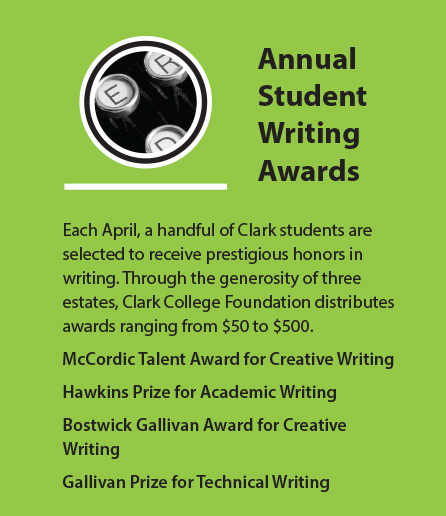 Qualified
Qualified
Duazo has blossomed at Clark and the English faculty wanted to celebrate her successes. She’s vice president of Clark’s honor society, Phi Beta Kappa. She was on staff of the 2016 Phoenix, the student literary and arts journal; started a student writers club; and held a part-time marketing and event organizing position with Subtext, the college’s literary festival.
In 2017, Duazo was honored with the McCordic Talent Award for her academic achievements and her dedication to the creative arts.
“She impressed me with her dedication, hard work and commitment to pursuing a career in writing,” said English professor Elizabeth Donley referring to the work they did together on Phoenix. Donley was part of the group that nominated and chose Duazo.
Edda McCordic would be proud of Duazo for pursuing her passion and defying the expectations of what a first-generation college student can do in her late forties. Education has no age boundaries and Edda McCordic knew that well.
Join Clark College during its fourth annual Subtext Literary Festival, May 14-18, 2018, for seminars and readings from well-known authors, as well as readings by Clark students and faculty. Subtext is part of Clark’s Columbia Writers Series.


